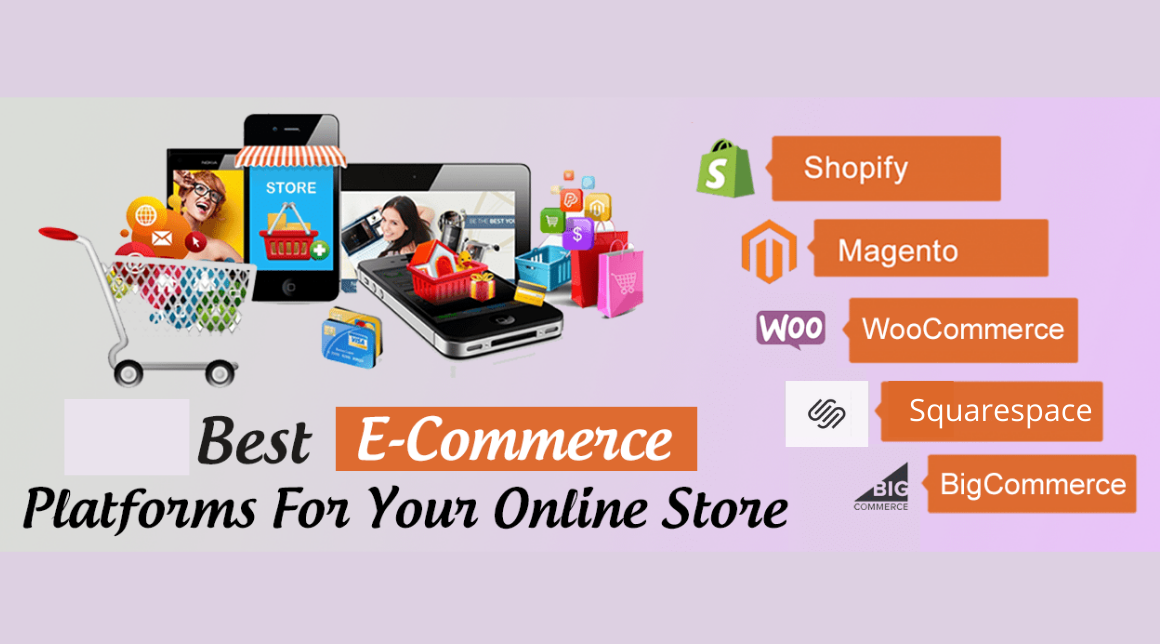In this post, we will discuss some of the most popular free and paid eCommerce platforms and their key features. Whether you are looking for a platform to run a small online business or large-scale eCommerce, this blog will help you make an informed decision.
eCommerce Platforms has emerged as the most dominant digital technology in 2020. As the coronavirus shattered physical markets, eCommerce became the savior for businesses and consumers alike. And this prompted a massive surge in eCommerce website development worldwide. Businesses across industries are trying to adapt to this changing market dynamics. And a major part of their success in eCommerce depends on the technology they use.
Top Paid eCommerce Platforms
Paid eCommerce platforms are always better when it comes to enterprise-grade services. Besides, you get superior tech support for seamlessly running your online business. These features only come with a paid eCommerce platform. Here are the best ones.
Shopify
Shopify one of the most popular platforms across industries and countries. The platform powers over one million online stores and have more than 2 million active users. Shopify offers a wide range of plans starting from $29/month. With its all-in-one eCommerce capabilities, Shopify enables you to smoothly run an online store without knowing anything about coding or using Shopify website development services. Shopify is suitable for small businesses, medium enterprises, and large companies.
Apart from choosing the plans offered by Shopify, you can build custom eCommerce solutions using the Shopify platform. For that, you need to hire eCommerce developers who can customize the Shopify store per your specific needs.
Magento 2 Enterprise
The premium version of the Magento eCommerce platform comes with extensive features and capabilities. With enterprise performance, scalability, and business tools, Magento 2 Enterprise has immense popularity among medium businesses and large companies.
It also offers dedicated technical support to promptly resolve all your queries and issues. The eCommerce platform continuously upgrades its features and functionalities. Besides, there a swarm of Magento development services to build a personalized solution using the framework. Online stores built on the Magento 2 platform are incredibly experienced-driven and mobile-friendly.
Squarespace
Squarespace is an end-to-end eCommerce development platform. It’s more cost-effective than Shopify, with plans starting from $18/month. Squarespace also takes care of your eCommerce server management. It provides an array of tools to efficiently manage your online store. Besides, the platform offers an extensive range of customizable and mobile-optimized themes.
You can list an unlimited number of products on a Squarespace online store. However, you need to choose the Advanced Commerce Plan for Getting subscription selling options for getting the subscription selling options. Besides, you can customize your store by choosing Squarespace development services according to your eCommerce requirements.
Top Free eCommerce Platforms
An array of efficient and feature-rich open-source eCommerce development frameworks are available businesses with a limited budget. eCommerce solutions built on an open-source platform are incredibly popular among small and medium enterprises. Here are the best open-source eCommerce platforms.
Magento Open Source
The open-source edition of Magento (also known as Magento Community Edition) is best-known for its flexibility. If you are planning to build an online store fully customized according to your business, Magento is the best option to consider. However, you will have to hire Magento developers for building the desired solution.
One of the most striking features of Magento is its mobile-optimized functionality. Magento is supported by a vast community of eCommerce developers spread across the world. The eCommerce platform features integrated checkout, payment gateways, and shipping modules, among other things.
The Magento open-source eCommerce development framework gives you immense flexibility in building your store. Besides, you can also choose an array of extensions from the Magento Marketplace. Besides, Magento is integrated with PCI compliant payment processing.
WooCommerce
WooCommerce is a free eCommerce plugin for WordPress websites. Although WooCommerce is free, you must already have a WordPress website and hosting to run an online store using the platform. WooCommerce also enables you to enhance the online store using premium extensions, and other tools.
Themes are extremely important to the look and feel of your online store. WooCommerce, like WordPress, a range of free themes to create an attractive design for your store. Additionally, you can also buy premium themes. The eCommerce platform enables you to set up various payment gateways. Since it’s an open-source platform, you choose WooCommerce development services for better performance and results.
PrestaShop
PrestaShop is an open-source eCommerce development platform supported by a strong community. The platform gets regular updates and bug fixes. PrestaShop is available in more than 70 languages. Online stores built on PrestaShop are design-rich and highly mobile-responsive. You get to choose from a range of attractive premium themes for your PrestaShop store.
Using the PrestaShop eCommerce platform, you can also install and integrate various payment gateways. The platform offers both free and paid payment gateways according to your requirements. On the PrestaShop dashboard, store owners can add modules and customize them according to the specific business needs. Tech support on PrestaShop is provided by the developers’ community. Since it has a strong community, support is not a problem.
Free and Paid eCommerce Platforms: A Quick Overview
Choosing the right ecommerce platform is crucial for your online business. There are two main categories to consider: free and paid eCommerce platforms. Here’s a breakdown of the key points to help you decide:
Free Ecommerce Platforms:
- Pros:
- Cost-effective: They are a great starting point for businesses with limited budgets. No upfront fees or monthly subscriptions.
- Easy to use: Many free platforms offer user-friendly interfaces and drag-and-drop website builders, making them ideal for beginners.
- Basic features: They provide fundamental functionalities like product listing, shopping cart, and basic order management.
- Cons:
- Limited scalability: Free platforms often restrict features, storage space, bandwidth, and customization options as your business grows.
- Branding limitations: They may force you to display their branding on your store, which can dilute your brand identity.
- Transaction fees: Some free platforms charge per-transaction fees, which can eat into your profits as your sales volume increases.
- Less security and support: They may offer limited security features and customer support compared to paid platforms.
Paid Ecommerce Platforms:
- Pros:
- Scalability: Paid platforms offer the flexibility to scale your store alongside your business growth. They provide more storage, bandwidth, and advanced features.
- Customization: They offer greater control over the look and feel of your online store, allowing for a unique brand experience.
- Marketing tools: Many paid platforms offer built-in marketing tools like email marketing, SEO features, and abandoned cart recovery.
- Security and reliability: Paid platforms generally provide robust security features, SSL certificates, and reliable uptime.
- Stronger support: They offer dedicated customer support to assist you with any technical issues or platform-related questions.
- Cons:
- Monthly fees: Paid platforms require subscription fees, which can be a cost consideration for new businesses.
- Steeper learning curve: Some platforms might have a steeper learning curve compared to very user-friendly free options.
Wrapping up
Choosing the right framework and tools for your online store is not an easy undertaking. But a goal-oriented and informed approach will help you to pick the right free and paid ecommerce platforms. Whether you prefer a paid platform or an open-source one should be based on you’re the specific requirements you have. At OrangeMantra, a globally trusted eCommerce software development company, we have a team of eCommerce consultants and tech experts to guide you through the technology selection process. We thoroughly analyze your business model and requirements before suggesting any eCommerce platform.
FAQs
Q. How much does it cost to develop an eCommerce website?
The costs of building an eCommerce website vary widely, depending on your needs. If you need a simple online store with basic features and storefront, costs are comparatively lower. OrangeMantra offers reliable eCommerce development at a competitive price.
Q. What is Magento eCommerce?
Magento is a PHP-based eCommerce development platform. It provides online merchants with a flexible online store, and great control over the look, content, and functionality. Magento is mainly used by medium enterprises and large companies worldwide.
Q. How long does it take to develop a Squarespace website?
The development time of a Squarespace website usually takes a very short time since most templates and elements are ready to use. However, the development time depends on your requirements. If your requirements are limited and predefined it takes comparatively less time.
Still unsure whether a free and paid ecommerce platforms is right for your business? Don’t navigate the ecommerce landscape alone! Leverage the expertise of OrangeMantra.
Schedule a Free Consultation with our eCommerce consultants today! They can assess your specific needs and recommend the best platform to launch and grow your online store.























